MercoPress. South Atlantic News Agency
Tag: Aecio Neves
-
Monday, August 18th 2014 - 22:55 UTC
Marina exposes Dilma's 'soft belly': polls shows she could beat the president in a run-off
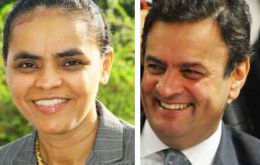
Environmentalist Marina Silva could unseat incumbent Dilma Rousseff in Brazil's presidential elections in October, a public opinion poll revealed on Monday, reflecting an altered political landscape since Silva's running mate was killed in a plane crash last week.
-
Monday, August 18th 2014 - 07:30 UTC
Brazil: Marina Silva still unconfirmed, rattles chances of Rousseff and Neves
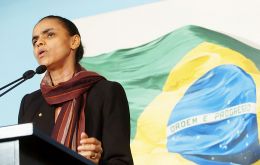
The Brazilian Socialist Party plans to launch environmentalist Marina Silva as its presidential candidate this week, replacing party leader Eduardo Campos who was killed in a plane clash, a senior party official said over the weekend.
-
Thursday, August 7th 2014 - 08:10 UTC
Rousseff claims EU has yet to agree on a proposal to exchange with Mercosur

President Dilma Rousseff claimed before the Brazil's farmers lobby that the trade agreement between Mercosur and the European Union is stalled and is not fulfilled because of the 'resistance' from several European countries, and specifically named France, Hungary and Ireland.
-
Thursday, July 17th 2014 - 05:24 UTC
Brazil’s main October presidential battle will take place in Sao Paulo
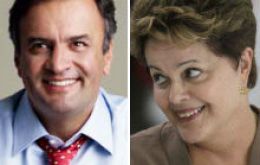
When opposition party Senator Aecio Neves officially kicked off his presidential campaign last week, he posted a video on Facebook calling for a “fairer, more efficient, and more generous Brazil”. However the word ‘efficient’ struck some as an odd rallying cry in a tropical country known for its, well, un-Swiss-like approach to time.
-
Monday, June 23rd 2014 - 03:52 UTC
Rousseff-Temer make official their re-election bid for 5 October
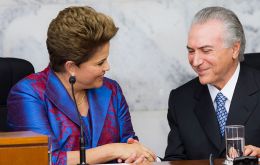
The ruling Workers Party, or PT, Latin America's largest political force of the left that has governed Brazil since 2003, proclaimed Saturday at its national convention the candidacy of President Dilma Rousseff for a second term in the coming Oct. 5 elections.
-
Thursday, June 5th 2014 - 07:20 UTC
High inflation and unemployment challenging Brazilian economy in election year
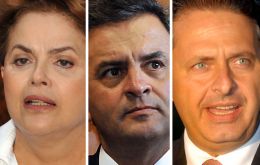
With the World Cup just eight days away, high inflation and unemployment is once again challenging Brazil’s economy, with the impact sure to influence this year’s election campaigns. Investors warned earlier this week that spending promises will undermine the fiscal discipline needed to restore confidence in the country and boost economic growth.
-
Wednesday, June 4th 2014 - 08:37 UTC
Brazilians pessimistic about the economy and benefits from the World Cup

Brazilians pessimism about the future of the economy has increased considerably with just a few days left for the opening of the World Cup, according to a public opinion poll released by Pew Research.
-
Thursday, May 1st 2014 - 07:08 UTC
Rousseff bids for re-election and announces benefits for her electoral base

President Dilma Rousseff said on Wednesday she will seek re-election in October, even though some are calling for the return of her popular predecessor president Lula da Silva. Rousseff, who belongs to Lula's Workers Party and was his protegée, said she hoped to have the support of all the parties allied with her government.
-
Monday, March 10th 2014 - 21:43 UTC
Rousseff's supporters fit the most with the profile of the average Brazil voter

The average Brazilian voter for this coming October presidential election is between 25 and 34 years old, has on average a high school education and a low monthly family income, equivalent to 618 US dollars. He lives in the Southeast region of the vast country, in a small town with fewer than 50,000 inhabitants.
-
Tuesday, July 23rd 2013 - 08:00 UTC
Polls confirm support for Rousseff has crashed and Lula da Silva becomes an option

Former president Lula da Silva is back leading opinion polls as the most likeable candidate for Brazil’s presidential election in 2014, eleven percentage points ahead of his successor and current president Dilma Rousseff according to the latest public opinion polls released over the week end.
